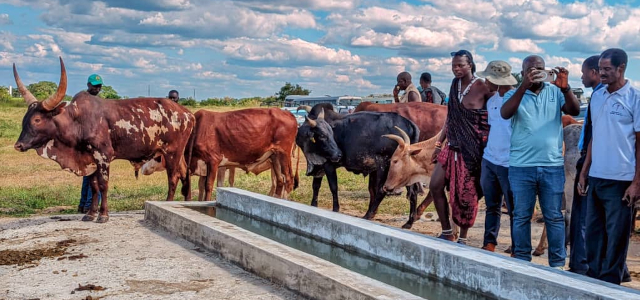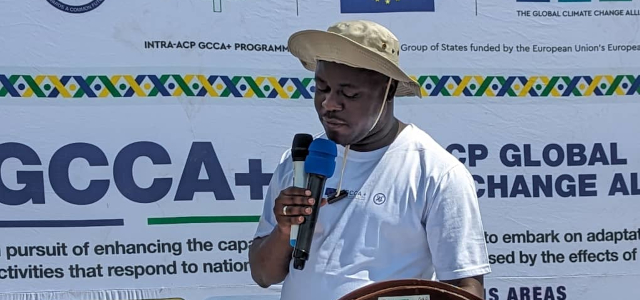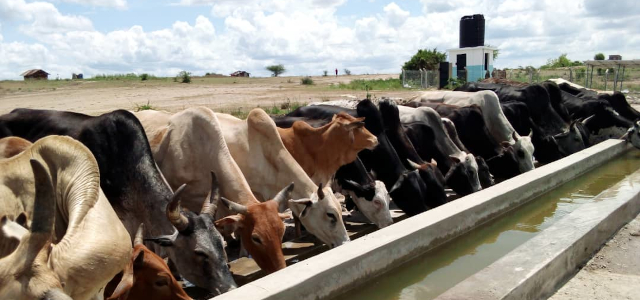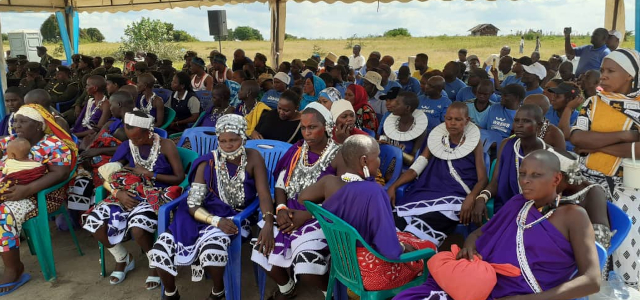The pilot project was facilitated by the Intra African, Caribbean, and Pacific (ACP) Global Climate Change Alliance Plus (GCCA+) Programme, under the SADC Secretariat and funded by the European Union (EU). The implementation of the Wami/Ruvu Project was championed by GWP Tanzania under the technical guidance of GWP Southern Africa on behalf of the GCCA+ Programme.
The Wami/Ruvu communities experienced environmental degradation as a result of domestic animals drinking water within the river basin. This project sought to provide a solar-powered borehole for the Maasai community and their livestock in the Ruvu Darajani Village. Approximately 2000 livestock and 5000 residents have benefitted from the water point thus reducing siltation and pollution of the Basin, and improving the livelihoods of the targeted communities.

Livestock using a water trough that has been constructed under the GCCA+ Project in Ruvu Darajani Village in Tanzania
The water points will be operated and maintained by the Community-Based Water Supply Organization (CBWSO) that is supervised by the Rural Water Supply and Sanitation Agency (RUWASA).
The GCCA+ Programme also constructed a Water Information Hub in Mvuha District for the Water Users Association (WUA) to use as a hydro-climatic information management centre as well as a training centre. The Water Resources Hub will be managed by the Water Users Association in Mvuha under the guidance of the Wami/Ruvu Basin Water Board.
Speaking on the occasion of the handover of the pilot project to the Water Board Authority, in Ruvu Darajani Village on the 6 June 2023, Honourable Jumaa Hamidu Aweso, Minister of Water, Government of the United Republic of Tanzania, stated that the Ruvu River is the main source of water for Dar es Salaam, Coast Region, and Morogoro hence there is need to put effort to conserve and protect the river basin for sustainable access to water.
“The biggest challenge in these areas is the arbitrary grazing that leads cattle to drink water in the river and breaks down the riverbanks, leading to rivers filling with sand and mud and losing direction, eventually causing flooding. This leads to a decrease in water quality, leading to increased water treatment costs. I urge you to do productive farming to increase livestock yields and reduce environmental damage to water sources to combat climate change,” he explained.
The Minister commended GWP Tanzania for spearheading the implementation of the GCCA+ project in Wami Ruvu Basin. “We are grateful to Global Water Partnership Tanzania for being a great partner in Tanzania and especially in showing a practical example on how IWRM can be a tool for addressing the impacts of climate change”, he said.

“RUWASA, local authorities and beneficiaries, you need to take good care of these facilities” - Honourable Jumaa Hamidu Aweso, Tanzania’s Minister of Water
Dr. Victor Kongo, Executive Director of GWP Tanzania thanked the Ministry of Water and the local community for their support in implementing the project. “Great efforts were undertaken to engage the Government and the local community and that is why the project was well received. We will continue to work very closely with the Government in implementing similar projects in other basins in the country”, he concluded.
Speaking during the handover of a similar project in Botswana on 30 June, Ms. Sibongile Mavimbela, Senior Programme Officer – SADC Secretariat, congratulated all the efforts of the project implementers, the communities, and authorities for the successful projects on the ground.
“The overall objective of the GCCA+ programme is to increase the capabilities of SADC Member States (MS) to mitigate and adapt to the effects of climate change, in support of the achievement of the Regional Indicative Strategic Development Plan (RISDP), Africa Agenda 2063 and Sustainable Development Goals (SDGs); and to have their voice better heard in the international climate change negotiations,” said Ms. Mavimbela.
The EU also spoke during the launch of a similar project in Botswana, where it referred to the Tanzania project stating that the Global Climate Change Alliance Plus project in the SADC region has enabled member states to pursue climate-resilient projects.
“This EU initiative helps mainly Small Islands Developing States (SIDS) and Developing countries increase their resilience to climate change. One of the specific activities is to scale up pilot climate change adaptation projects that have been implemented in the SADC region, with a view of testing approaches to climate resilience and identifying good practices, with a specific focus on the water-energy-food nexus (WEF nexus),” explained Mr. Clément Boutillier, Head of Cooperation, EU.
The handover of the project in Tanzania was preceded by a knowledge-sharing workshop between Tanzania and Botswana, both of which implemented GCCA+ related projects. Speaking during the workshop on 4 July at the Wami/Ruvu Basin offices, Eng. Elibariki Mmassy, Wami/Ruvu Basin Director emphasised the need for conservation efforts in the Wami/Ruvu basin, which is among the nine water Basins supporting the most populated regions or cities, including Dar-es-salaam and Dodoma.
“The economic and social developments of all these cities depend on the availability of water resources within the Basin. This is despite the water resources in the Basin facing various challenges including the occurrence of natural disasters, such as floods and droughts, which have been causing considerable socio-economic damage to our country. This is why we need more climate resilient efforts,” said Eng. Mmassy.

Livestock using a water trough that has been constructed under the GCCA+ Project in Ruvu Darajani Village in Tanzania
